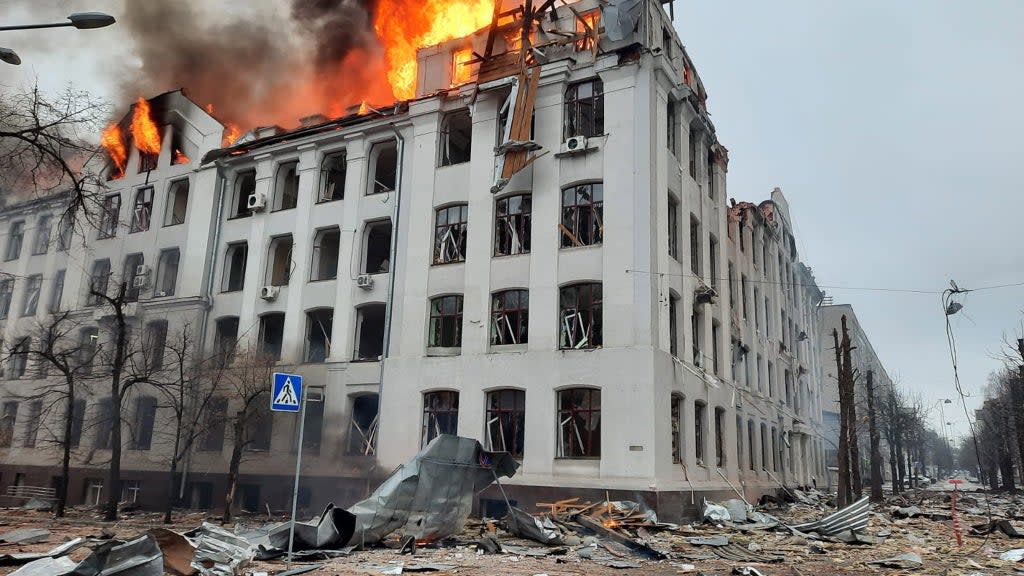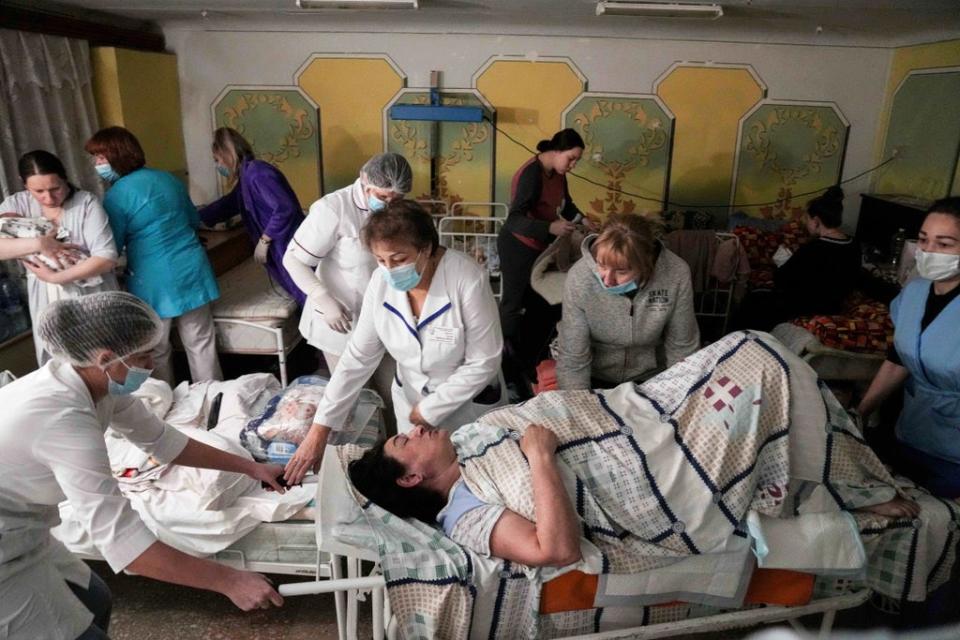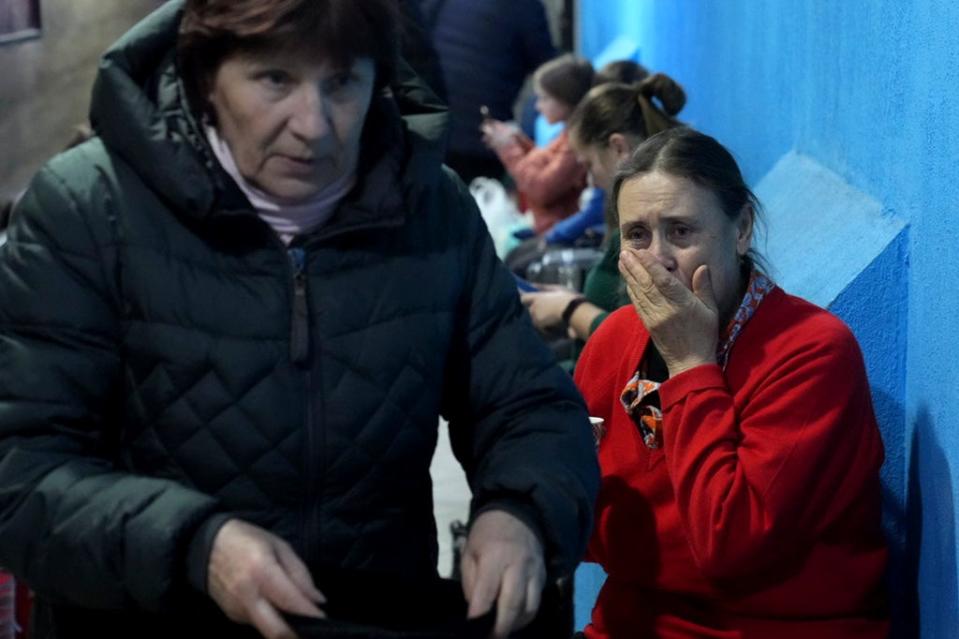Civilian deaths soar as Russian forces bombard key Ukraine cities

- Oops!Something went wrong.Please try again later.
- Oops!Something went wrong.Please try again later.
Fierce fighting and a sharply-growing death toll signal an increasingly bloody conflict in Ukraine, with Russian troops continuing to storm cities while building up a massive force of tanks and artillery preparing to lay siege to Kyiv.
A week into the war, Ukraine claimed that more than 2,000 of its civilians had been killed during the first week of the Russian invasion, while Moscow announced that it had so far lost 498 soldiers in the war — the first time it has given a figure.
Ukraine’s military maintains that around 6,000 Russians have been killed since fighting began while its emergency services say transport facilities, hospitals, kindergartens and homes have been destroyed.
Urban centres are increasingly under attackm with Russian shelling targeting several cities including Kharkiv, Kherson and Mariupol. There were also reports of explosions in Kyiv last night including a huge blast at the capital’s main train station.
With the Kremlin pouring more and more forces into the conflict and a steady ratcheting up of air and artillery strikes, Ukraine’s President Volodymyr Zelensky said Vladimir Putin’s orders were “to erase us all, erase our country, erase our history.”
Adding to the sense of growing chaos and a looming humanitarian disaster in the heart of Europe, the UN reported that more than 874,000 people have now fled Ukraine since the invasion began.
Kharkiv has been turned into a desolate landscape of smashed and burning buildings and gouged roads after days of fighting, as Russian forces, led by paratroopers, pushed deeper into the centre with repeated air strikes on the defending Ukrainian soldiers.
The 1.5 million inhabitants of the city, which was meant to become the centre of Ukraine’s new Silicon Valley, have either fled or were seeking refuge in shelters amid bombardment.
The city’s mayor, Ihor Terekhov, said in an online video statement that Russia’s actions amounted to “genocide”.
“Kharkiv is a Russian-speaking city. Every fourth person in Kharkiv has relatives in the Russian Federation. We never expected this could happen: total destruction, annihilation, genocide against the Ukrainian people - this is unforgivable.”
Two port cities, Kherson and Mariupol, have faced intense attacks, with the Russians at one stage reportedly taking over Kherson. The Ukrainian military said they were expecting amphibious landings by enemy forces along the Black Sea coast in Odessa and Zatoka.
There were also attempts, say Ukrainian authorities, by the Russians to capture Chernihiv, lying between Kyiv and the border with Belarus, along one of the main routes being taken by Moscow’s forces heading towards the capital. A number of administrative buildings and water and electricity supply facilities were damaged by rocket fire.
Sergei Lavrov, Russia’s Foreign Minister, added to an apocalyptic vision of the future by warning that a Third World War would mean the use of nuclear weapons. President Putin has placed his country’s nuclear force in a state of high alert.

Nuclear issues arising from the conflict have led the International Atomic Energy Agency (IAEA) to express grave concern over safety following fighting around the Zaporizhzhia nuclear power plant.
The Russian government told theIAEA that they have taken control of the facility, the workforce has returned and radiation levels “remain normal”.
Zaporizhzhia is Europe’s largest nuclear power plant and is the base for six out of Ukraine’s 15 nuclear energy reactors. Local people have been building roadblocks in the area to try and block Russian troops for two days.
The Ukrainian military maintain that around 6,000 Russians have been killed since the fighting began.
A second round of ceasefire negotiations are due to take place between Russia and Ukraine near the Belarus border amid the strife. Kremlin spokesperson Dmitry Peskov said: “In the second half of the day, closer to evening, our delegation will be in place to await Ukrainian negotiators.”
Mr Peskov refused to reveal the location of meeting. There is little optimism that the talks would lead to an end to hostilities after no common ground was said to have been reached at the first meeting at the Belarus borders on Monday.
The Kremlin’s offers of peace talks were viewed as risible by many people in the receiving end of Russian shelling.
In Kharkiv, Viktoria Burick, a 22-year-old student, told The Independent: “It is a joke, a very sick joke. How can they even speak of peace when they are bombing us day and night, ordinary people are getting killed and injured?
“My grandmother, she is 68, has had to live underground for the last two days in a shelter, there is no heating, no food. no water. My little brother and sister are terrified. I don’t believe Russians want peace at all, they are trying to fool the world.”
The mayor of Mariupol, Vadym Boichenko, said there is a prospect of mass casualties after Russian troops blocked exit routes while continuing attacks.

“They are flattening us non-stop for 12 hours now. The enemy occupying forces of the Russian Federation have done everything to block the exit of civilians from the city of half a million people”, he said.
“We cannot even take the wounded from the streets, from houses and apartments today, since the shelling does not stop.
“Our railway link has been cut – they even went to the railway station and fired on our diesel locomotives so that people can’t be evacuated. So their mission is to destroy us, they have no intention of helping civilians.”
Meanwhile, the crackdown on dissent about the war continued in Russia, with independent media outlets shut down. A group of primary schoolchildren were reported to have been arrested after holding up signs saying “no to war”.
Photographs appeared of the children with police officers behind metal bars of a police van and then at a police station. Novaya Gazeta, the Nobel prize-winning newspaper, later reported that the children have been released.

